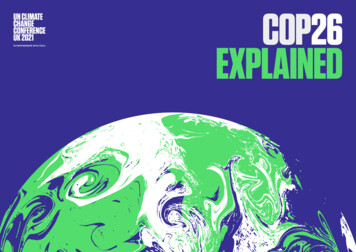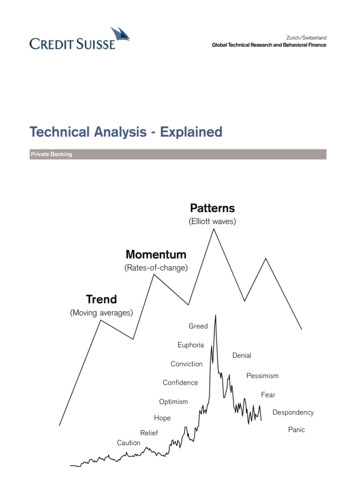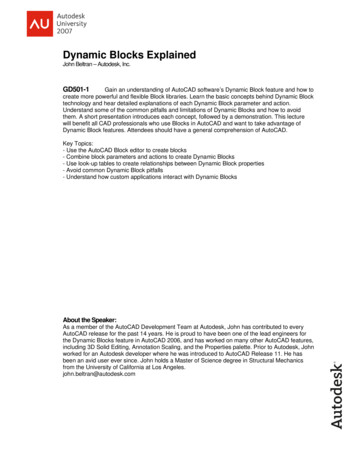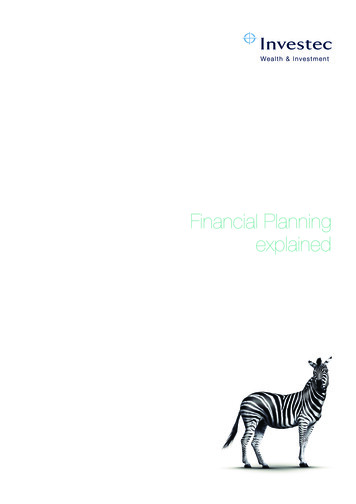
Transcription
COP26EXPLAINED
“Securing a brighter future for our children and future generations requirescountries to take urgent action at home and abroad to turn the tide on climatechange. It is with ambition, courage and collaboration as we approach thecrucial COP26 summit in the UK that we can seize this moment together, sowe can recover cleaner, rebuild greener and restore our planet.”PRIME MINISTER OF THE UNITED KINGDOMBORIS JOHNSON
FOREWORDThe COVID-19 pandemic has broughtdevastation to millions around theworld, disrupting many parts ofthe global economy. Governments,including our own, have stepped upto protect lives and livelihoods. Butclimate change has continued, and itultimately threatens life on earth.As countries begin to recover from theCoronavirus pandemic, we must takethe historic opportunity to tackle climatechange at the same time – to buildback better, and greener. We can delivergreen recoveries across the globe thatbring in good jobs, trillions in investmentand ground-breaking new technology.And we must. To keep the temperatureof the planet under control – limiting itsincrease to 1.5 degrees - the sciencedictates that by the second half ofthe century, we should be producingless carbon than we take out of theatmosphere. This is what reaching ‘netzero’ means.6COP26 EXPLAINEDThe journey is already underway. Despitethe pandemic, the direction of travelis changing. Around 70% of the worldeconomy is now covered by net zerotargets, up from less than 30% when theUK took on the Presidency of COP26.The world is moving towards a lowcarbon future. Clean energy, like windand solar, is now the cheapest sourceof electricity in most countries; manyof the world’s car makers are shifting tomake only electric and hybrid models;countries around the world are startingimportant work to protect and restorenature; cities, states and regions acrossthe world are also committing to reduceemissions to zero.Our country, the UK, is leading theway – over the last 30 years Britishgovernments have grown our economyby 78% while cutting emissions by 44%.That shows green growth is real. In 2012,40% of our electricity came from coal.That figure is now less than 2%. Thatshows that change is possible. The UKwas the first country to pledge to reducecarbon emissions by 78% by 2035, wewill completely phase out coal powerby 2024 and will end the sale of newpetrol and diesel vehicles by 2030. Weare introducing legally binding targetsto restore nature and radical reformsto agricultural subsidies. The PrimeMinister has set out a Ten Point Plan fora green industrial revolution to help usreach our climate commitments whilstcreating thousands of highly skilled jobsand already, many more Brits earn theirliving from clean green jobs.who are already seeing their homesdisappear under water and their cropsdecimated by drought - COP26 simplycan’t be another talking shop. In 2009,rich countries promised they wouldwork towards raising 100bn eachyear by 2020 to help these countriestackle climate change. Donors needto demonstrate that the target will bemet and surpassed. As COP PresidentDesignate, I am determined that we will.Around the world we are also seeingprogress. Together with the UnitedNations, Italy, France and Chile wehosted the Climate Ambition Summitwhich brought together 75 leaders fromaround the world. It was a major strideforward, with new commitments onclimate announced by every leader whojoined. It’s an important indicator thatwe are all serious about getting carbonemissions down now. Even so, we’regoing to need much more. We cannotwake up in 2029 and decide to slashour emissions by 50% by 2030. That’swhy the next six months will see theUK push others not to flinch from thebig policy decisions: ending coal power,phasing out polluting vehicles, makingagriculture more sustainable, tacklingdeforestation and supporting developingcountries with finance.There is no viable pathway to netzero emissions that does not involveprotecting and restoring nature on anunprecedented scale. If we are seriousabout holding temperature rises to 1.5degrees and adapting to the impactsof climate change, we must changethe way we look after our land and seasand how we grow our food. This is alsoimportant if we want to protect andrestore the world's biodiversity, uponwhich all life depends.Unfortunately reducing emissions is notenough. For many nations, the pictureis far bleaker. I was born in India and fora time I served as the UK government’sminister responsible for internationalaid – I have real sympathy with lessdeveloped countries that feel it’s for thedeveloped industrial nations to help sortout a problem largely of their making.Indeed, one of the reasons we aredetermined to hold COP26 in person isto ensure the voices of these countriesare heard and acted on.For those countries most vulnerableto the impacts of climate change -At COP26, we will work with partnersto take forward action on protectingand restoring forests and criticalecosystems, and we will champion thetransition towards sustainable, resilientand nature positive agriculture.COP26 needs to be decisive. Whetherfuture generations look back at this timewith admiration or despair, dependsentirely on our ability to seize thismoment. Let’s seize it together.ALOK SHARMACOP PRESIDENT-DESIGNATEFO R EWO R D7
INTRODUCTIONCLIMATE CHANGE IS THE GREATESTRISK FACING US ALL.Around the world storms, floods andwildfires are intensifying. Air pollutionsadly affects the health of tens ofmillions of people and unpredictableweather causes untold damage tohomes and livelihoods too. But whilethe impacts of climate change aredevastating, advances in tackling it areleading to cleaner air, creating goodjobs, restoring nature and at the sametime unleashing economic growth.Despite the opportunities we are not actingfast enough. To avert this crisis, countriesneed to join forces urgently.In November, the UK, together with ourpartner Italy, will host an event manybelieve to be the world’s last best chance toget runaway climate change under control.For nearly three decades the UN has beenbringing together almost every country onearth for global climate summits - calledCOPs - which stands for ‘Conference of theParties’. 'In that time climate change hasgone from being a fringe issue to a globalpriority. This year will be the 26th annualsummit – giving it the name COP26. Withthe UK as President, COP26 takes place inGlasgow.In the run up to COP26 the UK is workingwith every nation to reach agreement onhow to tackle climate change. More than190 world leaders are expected to arrive inScotland. Together with tens of thousandsof negotiators, government representatives,businesses and citizens for twelve days oftalks. Not only is it a huge task but it is alsonot just yet another international summit.Most experts believe COP26 has a particularurgency.8COP26 EXPLAINEDTo understand why, it’s necessary to lookback to another COP. COP21 took placein Paris in 2015. For the first time ever,something momentous happened: everycountry agreed to work together to limitglobal warming to well below 2 degrees andaim for 1.5 degrees, to adapt to the impactsof a changing climate and to make moneyavailable to deliver on these aims. The ParisAgreement was born. The commitment toaim for 1.5 degrees is important becauseevery fraction of a degree of warmingresults in the tragedy of many more liveslost and livelihoods damaged.Under the Paris Agreement, countriescommitted to bring forward national planssetting out how much they would reducetheir emissions - known as NationallyDetermined Contributions, or ‘NDCs’. Theyagreed that every five years they wouldcome back with an updated plan that wouldreflect their highest possible ambition atthat time.The run up to this year’s summit in Glasgowis the moment (delayed by a year due tothe pandemic) when countries updatetheir plans for reducing emissions. But,the commitments laid out in Paris did notcome close to limiting global warming to1.5 degrees, and the window for achievingthis is closing. The decade out to 2030 willbe crucial. So as momentous as Paris was,countries must go much further to keepthe hope of holding temperature rises to 1.5degrees alive.International climate summits are complex.Here in the UK COP26 team we want tomake it as easy as possible for you tounderstand what COP26 is and what theUK team is working to achieve. In thisintroduction you’ll find the summary of ourgoals; explanations of the processes, aglossary for technical phrases and perhapsmost importantly, ways for you to getinvolved.IN T RO DUCT IO N9
THE UK’SLEADERSHIPON CLIMATEThe UK has a lot to be proud of when itcomes to acting on climate change. Wehave shown that climate action can gohand-in-hand with economic growth.Between 1990 and 2019, we achievedrecord clean growth. In that time,our economy grew by 78% and ouremissions decreased by 44% over thistime, the fastest decline in the G7. We have decarbonised our economyfaster than any other country in the G20since 2000 We were the first major economy toput into law that we will reach net zerocarbon emissions by 2050 We are the largest producer of offshorewind energy in the world We will end direct government supportfor the fossil fuel energy sectoroverseas We are planting trees on 30,000hectares of land per year by 2025 We have announced plans that putfarmers at the forefront of reversingenvironmental decline and tacklingclimate change We will make climate-related disclosuresmandatory across the economy by2025, with most requirements comingin by 2023 The low carbon sector and supply chainprovides over 460,000 jobs in the UK.Our ambition is for up to 2 million greenjobs by 2030As the world looks to recover from the impactof coronavirus on our lives, livelihoods andeconomies, we have the chance to build backbetter. Our Ten Point Plan will help deliver agreen industrial revolution - by investing inclean energy, transport, nature and innovativetechnologies - creating hundreds of thousandsof jobs in the process.Leading the world in tackling and adaptingto climate change is a major economicopportunity for the UK, that will create newskilled jobs across the country as well asexport opportunities for our firms. We are doubling our internationalclimate finance to help developingnations with 11.6bn over the next fiveyears up to 2025/2026 We have announced the end of the saleof new petrol and diesel cars in the UKby 2030, putting the UK on course to bethe fastest G7 country to decarbonisecars and vans We will spend at least 3bn of ourinternational climate finance in the next5 years on nature and nature basedsolutions10COP26 EXPLAINEDUK LEADER SHIP11
WHAT DO WE NEED TOACHIEVE AT COP26?SECURE GLOBALNET ZERO BY MIDCENTURY ANDKEEP 1.5 DEGREESWITHIN REACH.Countries are being asked to comeforward with ambitious 2030emissions reductions targets (NDCs)that align with reaching net zero bythe middle of the century. To deliveron these stretching targets, countrieswill need to accelerate the phaseout of coal, encourage investmentin renewables, curtail deforestationand speed up the switch to electricvehicles.12COP26 EXPLAINEDADAPT TO PROTECTCOMMUNITIESAND NATURALHABITATS.The climate is already changing andit will continue to change even as wereduce emissions, with devastatingeffects. At COP26 we need to worktogether to enable and encouragecountries affected by climate changeto protect and restore ecosystems,build defences, put warning systemsin place and make infrastructure andagriculture more resilient to avoid lossof homes, livelihoods and lives.MOBILISEFINANCE.WORK TOGETHERTO DELIVER.To realise our first two goals,developed countries must deliveron their promise to raise at least 100bn in climate finance per year.International financial institutionsmust play their part and we need towork towards unleashing the trillionsin private and public sector financerequired to secure global net zero.We can only rise to the challenges ofclimate change by working together.At COP26 we must finalise theParis Rulebook (the rules needed toimplement the Paris Agreement). And,we have to turn our ambitions intoaction by accelerating collaborationbetween governments, businessesand civil society to deliver on ourclimate goals faster.WHAT DO WE N EED TO ACHIEVE AT CO P26 ?13
SECURE GLOBALNET ZERO ANDKEEP1.5 DEGREESWITHIN REACH.THE WORLD IS CURRENTLY NOT ON TRACK TO LIMIT GLOBALWARMING TO 1.5 DEGREES.The targets announced in Paris would result in warming well above3 degrees by 2100 compared to pre-industrial levels. If we continueas we are, temperatures will carry on rising, bringing even morecatastrophic flooding, bush fires, extreme weather and destructionof species.We have made progress in recent months to bend the temperature curvecloser to 2 degrees; but the science shows that much more must be done tokeep 1.5 degrees in reach. The world needs to halve emissions over the nextdecade and reach net zero carbon emissions by the middle of the century ifwe are to limit global temperature rises to 1.5 degrees.As part of the Paris Agreement, every country agreed to communicate orupdate their emissions reduction targets - their Nationally DeterminedContribution (NDC) - every five years to reflect their highest possible ambitionand a progression over time. These targets set out how far countries planto reduce emissions across their entire economy and/or in specific sectors.2020 marked the first of these five year cycles. This means that countries areexpected to update their 2030 targets before we meet in Glasgow. We arecalling on all countries to update them so that they are in line with holdingtemperature rise to 1.5 degrees. It is especially important that developedcountries and the largest emitters take the lead.While targets are important, they must translate into action, fast. Which iswhy developed countries must rapidly phase out coal power, and all countriesshould commit to not opening or financing any new coal-firedpower stations across the world.At the same time, we must work together to provide developing countrieswith better support to deliver clean energy to their citizens.Forests play a vital role in removing carbon from the air. Protecting themis critical if we are going to meet our climate goals, and right now theyare still being lost at the rate of a football pitch every few seconds. Weare encouraging countries to work together to reform the global trade inagricultural commodities (like beef, soy and palm oil) so that sustainableproduction is rewarded, helping farmers to make a better living while forestsare protected.And finally, we need to clean up our air and reduce carbon emissions byswitching to driving zero emission cars, vans and trucks. The UK will end thesale of new petrol and diesel cars by 2030. Countries with major car marketsshould follow our lead. If we send a strong signal to the industry, investmentwill shift more quickly to new, clean technologies, and all countries will beable to enjoy the benefits sooner.14COP26 EXPLAINED1 .5 DEGR EES15
ELIZABETH WATHUTIWE ARE MAKING PROGRESSAround 70% of the world’s economy is now committed to reaching net zeroemissions, up from 30% when the UK took over as incoming COP Presidency.More than 80 countries have formally updated their NDCs, and all G7countries have announced new NDC targets that put them on the path tonet zero emissions by 2050.Accounting for around half the global economy, all the countries that makeup the G7 have updated their 2030 targets to put them on a pathway to netzero by 2050.Solar and wind are now cheaper than new coal and gas power plants in twothirds of countries of the world.16COP26 EXPLAINEDWE HAVE TO ACT URGENTLY"COP26 presents an opportunityfor the world to take immediateaction to end the fossil fuel era andstart regenerating nature whileensuring that all our remainingnatural ecosystems stay intact.As nations look to rebuild theireconomies in the wake of COVID19,we have seen an emphasis on‘building back better’ througha green recovery. More andmore countries, businesses, andinvestors are also coming forwardwith commitments to decarbonizeby 2030 or 2050. But while theselong-term commitments senda very important signal, it is thedecisions we make today thatreally matter. What we say yes to.What we say no to and where wechoose to invest our human andfinancial capital right now and notin years to come. The eyes of theyoung people are on COP26 andbeyond and every day, minute, andhour that passes without urgentaction translates to failing futuregenerations. The climate crisis isalready causing loss and damagefor so many people and while wemay all be in the same storm; weare definitely not all in the sameboat. COP26 is an opportunity anda time to move from commitmentsto real urgent action."LORD ZAC GOLDSMITHPRIORITISE NATURE"We need to back nature with thesame energy we have seen inrelation to the clean technologyrevolution. As governments plantheir economic recoveries fromCovid-19, we have a once-ina-generation opportunity toreconcile our economies withthe natural world and delivera greener, safer and moreprosperous future."LORD ZAC GOLDSMITHMINISTER FOR PACIFIC AND THE ENVIRONMENTELIZABETH WATHUTIGLOBAL SOUTH CO CHAIR OF THE COP26 CIVILSOCIETY AND YOUTH ADVISORY COUNCIL AND THEFOUNDER OF THE GREEN GENERATIONAL INITIATIVE1 .5 DEGR EES17
URGENTLYADAPT TOPROTECTCOMMUNITIESAND NATURALHABITATS.PEOPLE ACROSS THE WORLD ARE ALREADYLIVING WITH DEVASTATING EXTREME WEATHERHEIGHTENED BY THE CHANGING CLIMATE.Even as we work tirelessly to reduce emissions, furtherchange is inevitable. We know that the most vulnerableare at the greatest risk from climate change, and thatthey have done the least to cause it. Action to addressthis and build resilience is needed now, before morepeople lose their lives or livelihoods.The international community must unite and support people whoare most vulnerable to the impacts of the changing climate. Weneed more action to avert, minimise and address the loss anddamage that is already occurring from climate change. Plans andmore finance need to be put in place to improve early warningsystems, flood defences, and build resilient infrastructure andagriculture to avoid further loss of life, livelihoods and naturalhabitats.Protecting and restoring habitats is a powerful way to boostresilience to the impacts of the changing climate. They helpto build natural storm and flood defences, whilst flourishingecosystems contribute to sustainable farming and supportbillions of lives worldwide.All countries should produce an ‘Adaptation Communication’,which is a summary of what they are doing and planning to doto adapt to the impacts of the changing climate, challenges theyface and where they need help. These plans will help us learntogether and share best practice between countries.The UK has co-developed the Adaptation Action Coalition, inpartnership with Egypt, Bangladesh, Malawi, the Netherlands,Saint Lucia and the United Nations Development Programme.The coalition is bringing countries together to find solutions tosome of the most challenging impacts of climate change, andwe are inviting all countries to join us.18COP26 EXPLAINEDCO MMUN IT IES AN D N AT UR AL HABITATS.19
ANNE-MARIETREVELYANWE HAVE TO WORKTOGETHER"In my role, I am acutely awareof the need to listen to and workwith countries on the frontline ofclimate change to drive forwardglobal action on adaptation to theimpacts and avert, minimise andaddress loss and damage. With theimpacts of COVID-19, it is vitallyimportant we work together toscale up finance from all sourcesand improve access (to finance).We must push for all countries tohave National Adaptation Plans inplace and to produce AdaptationCommunications sharing bestpractice to help turn ambition intoaction."ANNE-MARIE TREVELYANUK INTERNATIONAL CHAMPION ON ADAPTATIONAND RESILIENCE FOR THE COP26 PRESIDENCY20COP26 EXPLAINEDWE ARE MAKING PROGRESSOver 20 countries have joined the Adaptation Action Coalition, buildingon the 2019 Call for Action on Adaptation and Resilience signed by over120 countries.1500 businesses, investors, regions & cities have joined the Race toResilience all are committed to take action on adaptation to build aresilient future.Over 40 countries and organisations have joined the Risk-InformedEarly Action Partnership commiting to make 1 billion people safer fromdisaster by 2025.CO MMUN IT IES AN D N AT UR AL HABITATS.21
TO ACHIEVE OUR CLIMATE GOALS, EVERY COMPANY,EVERY FINANCIAL FIRM, EVERY BANK, INSURER ANDINVESTOR WILL NEED TO CHANGE.Countries need to manage the increasing impacts of climatechange on their citizens’ lives and they need the funding to doit. The scale and speed of the changes we need to make willrequire all forms of finance: public finance for the developmentof infrastructure we need to transition to a greener and moreclimate-resilient economy; private finance to fund technologyand innovation, and to help turn the billions of public moneyinto trillions of total climate investment.Developing countries in particular need support. Developed countriesmust deliver on their promise to raise at least 100 billion everyyear in climate finance to support developing countries. The OECDestimates that 78.9bn of climate finance was mobilised in 2018. Thismust include building new markets for adaptation and mitigationand improving the quantity, quality and access to finance to supportcommunities around the world to take action on the changing climate.The UK is doubling our International Climate Finance commitmentto at least 11.6 billion between 2021 and 2025. We want as manycountries as possible to follow our lead and increase their commitmentthrough to 2025.Ahead of COP26, we must work to unleash the trillions in privatefinance that are needed to power us towards net zero by the middleof the century. To do this, every financial decision needs to takeclimate into account. This includes all private investment decisions,but also all spending decisions that countries and internationalfinancial institutions are making as they roll out stimulus packagesto rebuild economies from the pandemic.Companies need to be transparent about the risks and opportunitiesthat climate change, and the shift to a net zero economy pose totheir business. Central banks and regulators need to make sure thatour financial systems can withstand the impacts of climate changeand support the transition to net zero. It also means banks, insurers,investors and other financial firms committing to ensuring theirinvestments and lending is aligned with net zero.22COP26 EXPLAINEDMOBILISEFINANCE.MO BILISE F IN AN CE.23
GLASGOW FINANCIAL ALLIANCEFOR NET ZEROBELLA LACKMARK CARNEYTo deliver on the Paris Agreementthe whole global economy needs toshift. Companies, banks, insurersand investors all have to adjust theirbusiness models and develop credibleplans for the transition to a net zeroeconomy and implement them.WE HAVE TO CHANGE“Right now our species isundermining and destabilising thevery foundations that are necessaryfor life on earth to thrive. We knowthat things are changing, and COP26is one of our last and most crucialopportunities to make sure it ishumanity that has to change, and notthe planet.”BELLA LACKGLOBAL NORTH YOUTH CO-CHAIR OF THE COP26CIVIL SOCIETY AND YOUTH ADVISORY COUNCIL24COP26 EXPLAINEDTo encourage the financial sector to domore, the COP Presidency, the UN HighLevel Climate Champions and Mark Carneyhave launched the Glasgow FinancialAlliance for Net Zero (GFANZ). This alreadyunites over 160 firms, together responsiblefor assets in excess of US 70 trillion, fromthe leading net zero initiatives across thefinancial system to accelerate the transitionto net zero emissions by 2050 at the latest.These initiatives must all be accreditedby the Race to Zero, which means usingscience-based guidelines to reach net zeroemissions and setting 2030 interim targets.GFANZ includes 43 banks representing 28.5 trillion through the Net Zero BankingAlliance, 87 asset managers representing 37 trillion through the Net Zero AssetManagers Initiative, and 37 asset ownersrepresenting 5.7trillion through the NetZero Asset Owner Alliance. GFANZ willdrive and raise the ambition of the financialsector towards COP26 and beyond."Finance is essential to acceleratingthe transition to net zero andachieving the full ambition of theParis Agreement. Over the pastyear, the public and private sectorshave been working hard to putthe plumbing in place to ensurethat every financial decision takesclimate change into account. In thefinal 6 months to COP26, we mustbuild on that foundation throughcommitments to net zero fromthe world’s major private financialinstitutions and with new marketsthat help meet the needs of thedeveloping world."MARK CARNEYTHE PRIME MINISTER’S FINANCE ADVISER FORCOP26WE ARE MAKING PROGRESSThe OECD estimates that 78.9bn of climate finance was mobilised in 2018.Multilateral development banks estimated that 41.5 billion was provided todeveloping countries in 2019.The Glasgow Financial Alliance for Net Zero represents over 70 trillion ofassets committed to net zero by 2050.Over 2000 organisations around the world support the Taskforce for ClimateRelated Financial Disclosures (TCFD).17 central banks have committed to stress testing their financial systemagainst climate risks.MO BILISE F IN AN CE.25
REACHING AGREEMENT IN THE NEGOTIATIONSIS OUR FORMAL RESPONSIBILITY AS THEPRESIDENCY OF COP26.Doing so will help deliver on our other three goalsand show everyone that the world is moving to aresilient, net zero economy.A focus for the negotiations is finalising the rules neededto implement the Paris Agreement, called the ‘ParisRulebook’. We must find solutions so that carbon marketscan enable greater ambition in mitigation and adaptationactions. We must resolve the issues around transparentreporting to build confidence in the system and support allcountries to meet their commitments. And we must brokeran agreement that drives ambition from governments overthe coming years to keep 1.5 degrees alive.WORK TOGETHERTO DELIVER.The UN negotiations are consensus-based, and reachingagreement will depend on leaving no issue behind andmaking sure everyone’s voice is heard. Which is why weare working hard to remove barriers that prevent everyonefrom participating in COP26 and championing the voicesof communities vulnerable to climate change, includingindigenous peoples and communities grappling with thetransition from high carbon activities.However, finalising the Paris Rulebook on its own will notdeliver net zero. This decade is decisive and we need toturn ambition into action. Governments, business and civilsociety (sometimes called ‘non-state actors’) need to worktogether to transform the ways we power our homes andbusinesses, grow our food, develop infrastructure andmove ourselves and goods around. Which is why we areworking hand in glove with the UN High Level Championson Climate Action to catalyse transformation in the globaleconomy.By committing to work together in this way we are layingthe foundations for faster progress in the decade to come.26COP26 EXPLAINEDWO R K TO GET HER27
NIGEL TOPPINGMICHELLESCRIMGEOURWE WANT TO DELIVERINACTION IS NOT AN OPTION“States and non-state actorsalike are galvanizing behind theguiding star of net zero emissionsbefore 2050, but we are runningout of time. We must urgently pivotto delivering the halving of ouremissions by 2030, with robustshort term plans and longer termstrategies, if we want to deliver thepromise of the Paris Agreement.”"To create a better future we needto harness collective agreement tofocus on net zero commitments.Our purpose is unequivocal inprotecting both society andfuture generations from theconsequences of climate change.NIGEL TOPPINGUN HIGH-LEVEL CHAMPION FOR CLIMATE ACTIONThis is also the investmentopportunity of our lifetime. Comingtogether as business leaders,in the countdown to the COP26Summit, we can align our influenceand financial might to the netzero ambition and so producepositive sustainable economicand environmental returns. Thisis inclusive capitalism in action inaction is not an option.”MICHELLE SCRIMGEOURCHIEF EXECUTIVE OFFICER, LEGAL & GENERALINVESTMENT MANAGEMENT, CO-CHAIR, COP26BUSINESS LEADERS GROUP28COP26 EXPLAINEDWO R K TO GET HER29
THE ROADTO COP26We are already on the road to COP26and there are several important eventsalong the way where we are workinghard to deliver on the goals of the UKCOP Presidency.Glasgow will be the culmination of tirelesswork by the UK Presidency over the courseof 2020 and 2021, which will continue untilat the end of 2022. Where we hand overthe Presidency at COP27 to an Africancountry. As is dictated by the UN’s systemof regional orientation.LEADERS SUMMIT ON CLIMATE22-23 April 2021FIFTY-FOURTH SESSION OF THEINTERGOVERNMENTAL PANEL ON CLIMATECHANGE (IPCC-54) AND WORKING GROUP IASSESSMENT REPORT 6 APPROVAL PLENARY26 July - 6 August 2021The Leaders Summit on Climate was convened byUS President Biden and brought 40 world leaderstogether to encourage stronger climate ambition.The US and Japan made ambitious commitments toreduce emissions by 2030, coming out of the summitevery country in the G7 had an NDC putting them onthe path to net-zero 2050.The IPCC is currently producing its Sixth AssessmentReport (AR6). The contribution from Working GroupI assesses the physical science basis of climatechange. It will provide a key input into the negotiationsat COP26.PETERSBERG CLIMATE DIALOGUE6-7 May 202176TH SESSION OF THE UN GENERAL ASSEMBLY(UNGA)14 September 2021As incoming COP President the UK co-hosted thePetersberg Climate Dialogue with Germany, bringingtogether Ministers from around 40 countries to worktogether to accelerate progress on negotiations inadvance of Glasgow.UNGA brings together leaders of the UN MemberStates to discuss global challenges including recoveryfrom COVID-19 and tackling c
increase to 1.5 degrees - the science dictates that by the second half of the century, we should be producing less carbon than we take out of the atmosphere. This is what reaching ‘net zero’ means. The journey is already underway. Despite the pandemic, the direction of travel is changi










